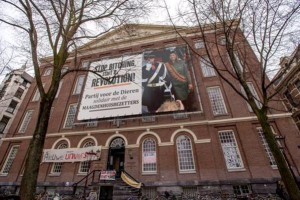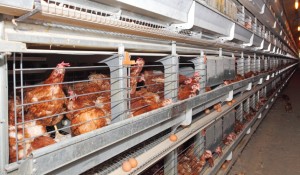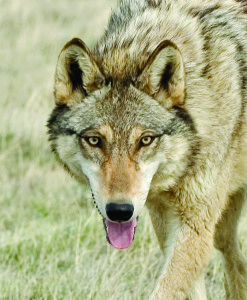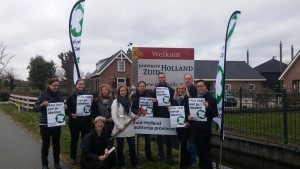Worldlog Semaine 12 – 2015
Cette semaine, notre nouveau documentaire One Single Planet (‘une seule planète’) est passé en première à Amsterdam et le week-end passé, il a été projeté dans 10 autres villes aux Pays-Bas. On en est très fier! One Single Planet est un documentaire sur les problèmes majeurs de durabilité qui menacent notre planète. Mais c’est aussi un documentaire qui offre des solutions afin de sauver la Terre pour les futures générations.
Pour réaliser ce film, j’ai parlé avec des scientifiques, des politiciens et des penseurs éminents. Entre autres Vandana Shiva, Prof. Arjan Hoekstra, le rapporteur alimentaire de l’ONU Dr. Hilal Elver, Prof. Hans Zaaijer et Prof. Jan Willem Erisman ont la parole. Sur la base de quatre thèmes, à savoir la faim dans le monde (1), la crise mondiale de l’eau (2), les zoonoses (3) et le problème de la biodiversité (4), des scientifiques réfléchissent sur les causes et les solutions possibles aux crises ayant prise sur le monde. C’était un grand honneur que notre documentaire pouvait passer en première dans le bâtiment de l’université, nommé ‘Maagdenhuis’, actuellement occupé par des étudiants, où les étudiants protestent contre les économies dans l’éducation et la nature non-démocratique des universités. Un signe d’espoir de la part d’une jeune génération qui ne reste plus les bras croisés pendant que la dégradation progresse.
On peut déjà regarder le film en néerlandais sur le site www.onesingleplanet.nl. Bientôt aussi en anglais!
L’année dernière, les Pays-Bas ont été en proie à une épidémie de grippe aviaire. Des millions d’animaux ont été abattus dans le secteur de la volaille. La dernière épidémie de grippe aviaire avait lieu vers la fin de l’année dernière, mais maintenant la fatalité a de nouveau frappé. Sur une ferme dans la commune néerlandaise de Barneveld la semaine dernière une nouvelle vague de grippe aviaire a été constatée. 30 000 poules sont abattues maintenant par mesure de précaution. Les poules vivantes sont mises dans des sacs, puis gazées dedans. Des œufs et des cuisses de poulets à bas prix sont vraisemblablement plus importants que le bien-être des animaux et les risques pour la santé publique…
À part les poules à Barneveld, je m’inquiète aussi pour les poulets désinfectés au chlore. En effet, les poulets américains au chlore pourraient être admis sur le marché européen. L’intention d’abolir l’actuelle interdiction d’importation portant sur les poulets désinfectés au chlore me semble un exemple de la façon dont les négociations sur le traité de libre-échange TTIP ont déjà un impact négatif visible sur les normes européennes. J’ai donc immédiatement posé des questions parlementaires à ce sujet.
Heureusement, j’ai également de bonnes nouvelles. Le loup a de nouveau été signalé aux Pays-Bas! Malheureusement, il y était juste un court moment avant de traverser à nouveau la frontière avec l’Allemagne. Mais les loups contribueraient énormément à la biodiversité des Pays-Bas. Les Pays-Bas ont perdu beaucoup de leur biodiversité et le loup rendrait la nature aux Pays-Bas à nouveau un peu plus complète. Un grand prédateur tel que le loup peut notamment jouer un rôle-clé dans notre écosystème. Espérons qu’il revienne avec plusieurs loups, sous forme de bande, dans notre pays.
Dans le cadre des élections pour les États Provinciaux le 18 mars, j’ai participé à une manifestation dans la province de l’Hollande du Sud pour protester contre la chasse en tant que passe-temps. Cette forme de chasse est un thème important dans les élections pour les États Provinciaux. Avec Carla van Viegen, notre chef de liste pour la province de l’Hollande du Sud, j’ai déjà symboliquement déclaré la province exempte de la chasse comme passe-temps! Je suis aussi allée aux provinces d’Overijssel et d’Utrecht pour protester contre la chasse.
Mercredi prochain, c’est enfin le grand jour des élections. Nous faisons bien dans les sondages, et nous pouvons compter sur des sièges dans toutes les provinces dans lesquelles nous participons. Il nous reste seulement quelques jours pour mener à fond notre campagne avant que le grand jour soit là. La semaine prochaine, je vous informe bien sûr des résultats.
Cordialement, Marianne
Our new documentary One Single Planet had its world premiere in Amsterdam last week and was shown in 10 towns in the Netherlands last weekend. Very proud! One Single Planet is a documentary about the major sustainable problems threatening our planet. But it is also a documentary about the solutions to keep the earth habitable for future generations.
For this film, I spoke with leading scientists, policy-makers and thinkers. Speakers include Vandana Shiva, professor Arjan Hoekstra, United Nations food rapporteur Dr. Hilal Elver, professor Hans Zaaijer and professor Jan Willem Erisman. Based on four themes, the world food problem (1), the world water crisis (2), zoonoses (3) and the biodiversity problem (4), scientists think together about causes of, and possible solutions for, the crises that keep the world in its grip. It was a great honour that our documentary was allowed to have its premiere in the Maagdenhuis university building, which is currently occupied by students who are protesting against cuts backs on education and the undemocratic nature of universities. A hopeful sign from a young generation that no longer stands by while the destruction continues.
The film can already be seen in Dutch on the website www.onesingleplanet.nl. Soon also in English!
Last year, the Netherlands were plagued by a bird flu epidemic. Millions of animals in the poultry sector were killed. The most recent bird flu outbreak occurred at the end of last year, but now fate has struck again. Last week, there was a bird flu outbreak on a farm in the Dutch municipality of Barneveld. 30,000 chickens will be killed as a precaution. The chickens will be put in bags while they are still alive and then be gassed in the bags. Cheap eggs and chicken legs are apparently more important than animal wellbeing and the risks to human health…
In addition to worrying about the chickens in Barneveld I also worry about chlorine chickens, because American chlorine chickens are likely to be admitted to the European market. The intention to lift the import ban on chlorine chickens which is currently still in place seems to me an example of how negotiations on the TTIP free trade agreement already have a visibly negative effect on European standards. I have therefore immediately asked Parliamentary questions about this.
Fortunately, I also have good news. The wolf has been spotted again in the Netherlands! Unfortunately, he was only here for a short while and now he has crossed the border with Germany again. But wolves in the Netherlands would make a substantial contribution to our biodiversity. The Netherlands have lost a lot of biodiversity and the wolf would make nature in the Netherlands much more complete. A major predator such as the wolf could play a key role in our ecosystem. Hopefully, he will come back into our country, together with more wolves, in a pack.
In the context of the Provincial Council elections on 18 March, I participated in a protest against leisure hunting in the province of South Holland. Leisure hunting is a major topic in the Provincial Council elections. Together with Carla van Viegen, our leading candidate for the province of South Holland, I already declared the province symbolically hunt-free! Also, I went to the provinces of Overijssel and Utrecht to protest against hunting.
Next Wednesday is big election day. We are doing well in the polls and we can count on seats in all of the provinces in which we participate. Another few days of fervent campaigning and then the time has come. Next week, I will of course share the outcome.
Yours sincerely,
Marianne



